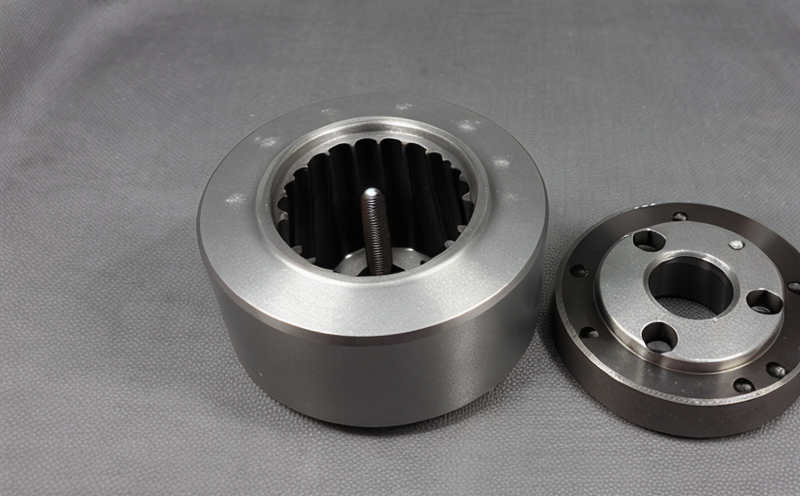ISO 2738 Density Testing of Sintered Metal Materials
The ISO 2738 standard provides a robust framework for determining the density of sintered metal materials. This test is crucial in ensuring that products meet their specified performance requirements and quality standards, particularly in industries like aerospace, automotive, and medical devices where precision and reliability are paramount.
During this process, samples undergo rigorous preparation to ensure accurate measurement. The first step involves selecting representative specimens from the batch or production run being tested. These specimens must be free of defects that could affect density readings, such as air voids or inclusions. Once selected, the sample is weighed accurately before undergoing further processing.
After conditioning (if necessary), the sample undergoes sintering to achieve a consistent microstructure and density across all parts being tested. Sintering involves heating compacted powder mixtures at temperatures below their melting points until they bond into solid materials without melting completely. Properly sintered samples are essential for obtaining reliable density measurements.
The density itself is calculated using the formula density = mass/volume, where volume can be determined either by water displacement or Archimedes' principle. For more accurate results, especially when dealing with complex shapes, hydrostatic weighing in an oil bath may be employed. This method accounts for surface tension effects that could otherwise lead to inaccurate readings.
Accurate density testing allows manufacturers and researchers to verify the quality of sintered metal components against industry standards such as ISO 2738 or ASTM B196-05a (formerly known as ASTM B196). Compliance with these specifications ensures consistent product performance across batches, thus enhancing customer satisfaction and trust in the brand.
Understanding the importance of density testing also helps in identifying potential issues early on during manufacturing processes. By monitoring changes in material properties through regular density checks, companies can detect anomalies indicative of poor processing conditions or raw material inconsistencies before they become costly problems later in production cycles.
| Industry | Application |
|---|---|
| Aerospace | Ensuring structural integrity and weight optimization for aircraft components |
| Automotive | Evaluating fuel efficiency improvements in lightweight vehicle parts |
| Bio-medical Devices | Verifying biocompatibility of implantable devices made from sintered metals |
Density testing plays a vital role in maintaining high-quality standards within various sectors by providing objective data that supports decision-making processes related to product design, manufacturing techniques, and quality control measures.
Why It Matters
The accuracy of density measurements directly impacts the performance capabilities of sintered metal materials used across numerous industries. In aerospace applications, for instance, slight deviations in material density can lead to significant weight variations which affect fuel consumption and overall efficiency of aircraft designs.
- In automotive manufacturing, ensuring proper density levels helps optimize vehicle weights contributing towards better fuel economy.
- For bio-medical devices, accurate density assessments ensure that implants function correctly without causing any adverse reactions within the human body.
By adhering to international standards like ISO 2738, organizations demonstrate their commitment to producing reliable and safe products. This not only enhances brand reputation but also fosters long-term business relationships with customers who value quality assurance above all else.
Industry Applications
| Application | Description |
|---|---|
| Aerospace Engineering | Determining optimal component density for weight optimization and structural integrity. |
| Automotive Manufacturing | Evaluating fuel efficiency through lightweight materials that enhance vehicle performance. |
| Bio-medical Device Production | Ensuring biocompatibility of implants made from sintered metals to prevent adverse reactions in patients. |
In each case, accurate density testing ensures compliance with relevant regulations and enhances product reliability. This is especially important given the critical nature of these industries where even minor errors can have severe consequences.
Why Choose This Test
Choosing ISO 2738 density testing offers several advantages over alternative methods or less stringent approaches:
- Precision: The standardized procedure ensures consistent results across different laboratories, enhancing reproducibility and accuracy.
- Compliance: Adherence to recognized international standards helps maintain regulatory compliance and fosters trust among customers.
- Quality Assurance: Regular density testing provides early detection of potential issues in the manufacturing process, allowing for corrective actions before they escalate into bigger problems.
- Reliability: Accurate measurements contribute to more reliable end products that meet specified performance criteria consistently.
These benefits make ISO 2738 density testing an indispensable tool for quality managers and compliance officers responsible for ensuring product excellence in metallurgy and material testing.





